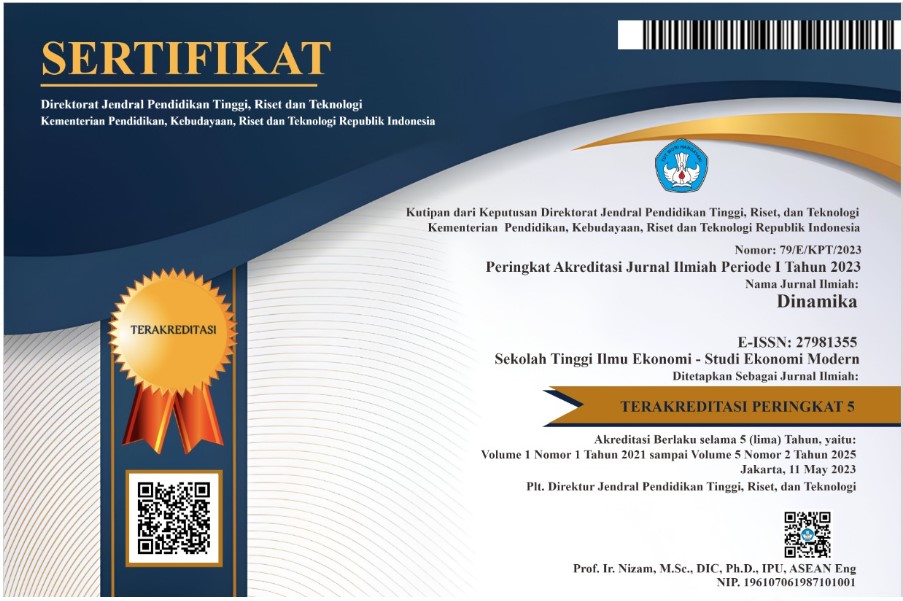PENGEMBANGAN ALAT UKUR KINERJA ORGANISASI BERBASIS SISTEM KOMPLEKS
DOI:
https://doi.org/10.51903/dinamika.v3i1.321Keywords:
Pengukuran Kinerja, Sistem Kompleks, Kemampuan Beradaptasi, Pengambilan Keputusan, Alat PengukuranAbstract
Studi ini bertujuan untuk mengembangkan instrumen untuk menilai faktor organisasi yang mendukung dan meningkatkan kapasitas adaptif dalam sistem yang kompleks. Studi ini akan mengatasi masalah kapasitas adaptif dalam sistem yang kompleks dari perspektif organisasi. Untuk mengukur kemampuan sistem yang kompleks untuk menavigasi kejadian buruk melalui adaptif, penelitian ini dibangun berdasarkan kapasitas literatur sebelumnya. Sistem yang kompleks harus adaptif, bertahan dan berkembang. Kapasitas adaptif memungkinkan sistem untuk beradaptasi dan mengatasi kondisi baru untuk mengembangkan instrumen untuk menilai faktor organisasi dalam meningkatkan kapasitas adaptif dalam sistem yang kompleks. Studi ini menggunakan grounded theory dalam menganalisis kumpulan data dari berbagai sumber, antara lain artikel jurnal, publikasi pemerintah, dan laporan investigasi. Metode penelitian ini merupakan metodologi empat langkah yang dimulai dari proses koding teori grounded, mengkonseptualisasikan faktor organisasi, mengembangkan instrumen penilaian, dan diakhiri dengan tahap validasi. Hasil dari penelitian ini adalah instrumen penilaian yang telah divalidasi oleh para ahli yang dapat diterapkan di berbagai industri yang mencakup faktor-faktor utama yang ada di semua organisasi modern, serta panduan bagi pengambil keputusan untuk mengambil keputusan yang tepat berdasarkan hasil penilaian. Instrumen penelitian terdiri dari tiga puluh delapan kriteria yang dikelompokkan ke dalam sembilan kategori, kemudian temuan penelitian divalidasi. Kontribusi penelitian ini tidak terbatas pada pengembangan teori tetapi merambah ke dunia nyata. Instrumen yang dikembangkan berdasarkan kriteria turunan berfungsi sebagai instrumen untuk mengukur tingkat kesiapsiagaan organisasi yang kompleks dalam menghadapi kejadian buruk dan menguji kemampuan mereka untuk beradaptasi dengan setiap gangguan. Dengan demikian, pengambil keputusan akan dapat mengungkap kekuatan dan kelemahan organisasi dan mengambil tindakan yang diperlukan. Kajian penelitian ini berfokus pada faktor organisasi yang tidak memasukkan unsur teknis dan sosioteknis karena beberapa dimensi ini unik untuk industri tertentu, sehingga untuk penelitian selanjutnya, kapasitas adaptif dapat diperluas ke area lain dalam industri tertentu.
References
Adger, W. N. (2006). Vulnerability. Global Environmental Change, 16, 268–281. https://doi.org/10.1016/j.gloenvcha.2006.02.006
Angkananon, K., Wald, M., & Gilbert, L. (2013). Issues in conducting expert validation and review and user evaluation of the technology enhanced interaction framework and method. https://eprints.soton.ac.uk/354164/
Astrid Gynnild. (2017). Celebrating 50 Years of Grounded Theory: Onward and Forward Editorial. Grounded Theory Review: An International Journal, 16(1). https://doaj.org/article/7472b3eb567b47f488adc62dd3107834
Bar-Yam, Y. (2019). Dynamics of complex systems. CRC Press.
Bergsma , E J , Gupta , J & Jong , P 2012 , ’ Does Individual Responsibility Increase the Adaptive Capacity of Society? The Case of Local Water Management in the Netherlands ’ , Resources, Conservation and Recycling , Vol. 64 , Pp. 13-22 . Https://Doi.Org/10.1016/j.Resconrec.2012.03.006.https://research.vu.nl/en/publications/f86ff355-c130-4cd1-b9a9-764d76f21e11
Ceddia, Michele Graziano; Christopoulos, Dimitris; Hernandez, Yeray; Zepharovich, Elena (2017). Assessing Adaptive Capacity through Governance Networks: The Elaboration of the Flood Risk Management Plan in Austria. Environmental Science & Policy, 77, Pp. 140-146. Elsevier 10.1016/j.Envsci.2017.08.014< Http://Dx.Doi.Org/10.1016/j.Envsci.2017.08.014> https://boris.unibe.ch/106656/
Charmaz, K. (2008). Grounded theory as an emergent method. Handbook of Emergent Methods, 155, 172.
Charmaz, K., & Belgrave, L. L. (2007). Grounded theory. The Blackwell Encyclopedia of Sociology.
Corbin, J. M., & Strauss, A. (1990). Grounded theory research: Procedures, canons, and evaluative criteria. Qualitative Sociology, 13(1), 3–21. https://doi.org/10.1007/BF00988593
Corbin, J. M., & Strauss, A. (1990). Grounded theory research: Procedures, canons, and evaluative criteria. Qualitative Sociology, 13(1), 3-21.
Corbin, J. M., & Strauss, A. L. (2008). Basics of qualitative research : techniques and procedures for developing grounded theory. Sage Publications.
Dalziell, E P, & Mcmanus, S. T. (2004). Resilience, vulnerability , and adaptive capacity: Implications for system performance.
David Parker. (2016). Property investment decision making by Australian unlisted property funds: an exploratory study. http://apo.org.au/node/74357
Dimitra Peppa. (2017). Natural Killer Cells in Human Immunodeficiency Virus-1 Infection: Spotlight on the Impact of Human Cytomegalovirus. Frontiers in Immunology, 8. https://doi.org/10.3389/fimmu.2017.01322
Ellis, B., & Herbert, S. (2011). Complex adaptive systems (CAS): An overview of key elements, characteristics and application to management theory. Journal of Innovation in Health Informatics, 19(1). pp. 33-37. ISSN 2058-4555 It. http://clok.uclan.ac.uk/17882/
Engel, D. W., & Dalton, A. C. (2012). CCSI Risk Estimation: An application of expert elicitation (No. PNNL-21785). Pacific Northwest National Lab.(PNNL), Richland, WA (United States).
Engle, N. L. (2011). Adaptive capacity and its assessment. Global Environmental Change, 21(2), 647–656. https://doi.org/10.1016/j.gloenvcha.2011.01.019
Engle, N. L., & Lemos, M. C. (2010). Unpacking fovernance : Building adaptive capacity to climate change of river vasins in Brazil. Global Environmental Change Journal, (February 2010). https://doi.org/10.1016/j.gloenvcha.2009.07.001
Erol, O., Mansouri, M., & Sauser, B. (2009). A framework for enterprise resilience using service oriented architecture approach. 2009 IEEE International Systems Conference Proceedings, (September 2014), 127–132. https://doi.org/10.1109/SYSTEMS.2009.4815785
Fazey, I., Fazey, J. A., Fischer, J., Sherren, K., Warren, J., Noss, R. F., & Dovers, S. (2015). Adaptive capacity and learning to learn as leverage for social-ecological resilience. Frontiers in Ecology and the Environment. http://hdl.handle.net/1885/33958
Fitriawati, F., & Suroso, D. S. A. (2017). Identification of Fishermen Household’s Adaptive Capacity in Responding to Climate Change Impacts (A Case Study of Muncar District, Banyuwangi Regency, Indonesia). The Indonesian Journal of Planning and Development; Vol 2, No 1 (2017): February 2017; 19-26 ; 2442-983X ; 2087-9733. https://ejournal2.undip.ac.id/index.php/ijpd/article/view/911
Ford, J. D., & King, D. (2015). A framework for examining adaptation readiness. Mitigation and Adaptation Strategies for Global Change, 20(4), 505–526. https://doi.org/10.1007/s11027-013-9505-8
Frick-Trzebitzky, F. 2017. Crafting adaptive capacity: Institutional bricolage in adaptation to urban flooding in Greater Accra. Water Alternatives 10(2): 625-64
Glaser, B. G. (1978). Theoretical sensitivity: Advances in methodology of grounded theory. Sociology Press.
Glaser, B. G. (1992). Emergence vs forcing : basics of grounded theory analysis. Sociology Press.
Glaser, B. G. (1998). Doing grounded theory: Issues and discussions. Sociology Press.
Glaser, B. G., & Strauss, A. L. (1967). The discovery of grounded theory. International Journal of Qualitative Methods.
Gupta, J., Termeer, K., Klostermann, J., Meijerink, S., Brink, M. Van den, Pieter, J., … Bergsma, E. (2010). The adaptive capacity wheel : A method to assess the inherent characteristics of institutions to enable the adaptive capacity of society. Environmental Science & Policy, 13(06), 459–471.
Hemming, V., Burgman, M. A., Hanea, A. M., McBride, M. F., & Wintle, B. C. (2018). A practical guide to structured expert elicitation using the IDEA protocol. Methods in Ecology and Evolution, 9(1), 169–180. https://doi.org/10.1111/2041-210X.12857
Hester, P., & Adams, K. (2014). Systemic Thinking, Fundamentals for Understanding Problems and Messes. Springer International Publishing
Horbach, S. E., Ubbink, D. T., Stubenrouch, F. E., Koelemay, M. J., Vleuten, C. J. M. van der, Verhoeven, B. H., Reekers, J. A., Schultze Kool, L. J., & Horst, C. M. van der. (2017). Shared Decision-Making in the Management of Congenital Vascular Malformations. Plastic and Reconstructive Surgery, 139, 3, Pp. 725e-734e. http://hdl.handle.net/2066/169822
Knol, A. B., Slottje, P., Van Der Sluijs, J. P., & Lebret, E. (2010). The use of expert elicitation in environmental health impact assessment: A seven step procedure. Environmental Health: A Global Access Science Source, 9(1), 1–16. https://doi.org/10.1186/1476-069X-9-19
Lee, A. V., Vargo, J., & Seville, E. (2013). Developing a tool to measure and compare organizations’ resilience. Natural Hazards Review, 14(1), 29–41. https://doi.org/10.1061/(ASCE)NH.1527-6996.0000075
Linkov, I., Bridges, T., Creutzig, F., Decker, J., Fox-Lent, C., Kröger, W., … Thiel-Clemen, T. (2014). Changing the resilience paradigm. Nature Climate Change, 4(6), 407–409. https://doi.org/10.1038/nclimate2227
Linkov, I., Eisenberg, D. A., Plourde, K., Seager, T. P., Allen, J., & Kott, A. (2013). Resilience metrics for cyber systems. Environment Systems and Decisions, 33(4), 471–476. https://doi.org/10.1007/s10669-013-9485-y
Luers, A. L., Lobell, D. B., Sklar, L. S., Addams, C. L., & Matson, P. A. (2003). A method for quantifying vulnerability, applied to the agricultural system of the Yaqui Valley, Mexico. Global Environmental Change, 13(4), 255–267. https://doi.org/10.1016/S0959-3780(03)00054-2
Man, N., Saharrudin, N. F., Abu Samah, A., & Mohamed Shaffril, H. A. (2017). Local leaders’ perception on the adaptive capacity towards climate change impacts among small scale fishermen. http://psasir.upm.edu.my/56606/
Mayntz, R. (1997). Chaos in society: Reflections on the impact of chaos theory on sociology. In C. Grebogi & A.Y. James (Eds.), The Impact of Chaos on Science and Society. United Nations University Press.
Nyamwanza, A. M. (2012). Livelihood resilience and adaptive capacity: A critical conceptual review. Jàmbá: Journal of Disaster Risk Studies, 4(1), 1–6. https://doi.org/10.4102/jamba.v4i1.55
Nykvist, B., Borgström, S., & Boyd, E. (2017). Assessing the adaptive capacity of multi-level water governance : ecosystem services under climate change in Mälardalen region, Sweden. Regional Environmental Change; 17(8), Pp 2359-2371 (2017) ; ISSN: 1436-3798. https://lup.lub.lu.se/record/47c7f317-5f40-4a26-9b24-e83c9500318c
Park, J., Seager, T. P., Rao, P. S. C., Convertino, M., & Linkov, I. (2013). Integrating risk and resilience approaches to catastrophe management in engineering systems. Risk Analysis. https://doi.org/10.1111/j.1539-6924.2012.01885.x
Pinto, C Ariel, & Mcshane, M. K. (2012). System of systems perspective on risk: Towards a unifed concept. International Journal of System of Systems Engineering, 3(1), 33–46.
Polsky, C. D., Yarnal, B., Polsky, C., & Neff, R. (2007). Building comparable global change vulnerability assessments: The vulnerability scoping diagram. Global Environment Change . https://doi.org/10.1016/j.gloenvcha.2007.01.005
Riedijk, L., & Harakeh, Z. (2017). Imitating the Risky Decision-Making of Peers: An Experimental Study Among Emerging Adults. https://dspace.library.uu.nl/handle/1874/372575
Ruiz Mallen, I., Fernández Llamazares, Á., & Reyes García, V. (2017). Unravelling local adaptive capacity to climate change in the Bolivian Amazon: the interlinkages between assets, conservation and markets. http://hdl.handle.net/10609/77587
Ruiz Mallen, I., Fernández Llamazares, Á., & Reyes García, V. (2017). Unravelling local adaptive capacity to climate change in the Bolivian Amazon: the interlinkages between assets, conservation and markets. http://hdl.handle.net/10609/77587
Shirima, A. O., Mahonge, C., & Chingonikaya, E. (2016). Smallholder Farmers’ Levels of Adaptive Capacity to Climate Change and Variability in Manyoni District, Tanzania. Inter. J. Res. Methodol. Soc. Sci, 2(1), 19–29. https://zenodo.org/record/1321514
Sikula, N., Mancillas, J., Linkov, I., & McDonagh, J. (2015). Risk management is not enough: Aconceptual model for resilience and adaptation-based vulnerability assessments. Environment Systems and Decisions, 35(2), 219–228. https://doi.org/10.1007/s10669-015-9552-7
Sikula, N., Mancillas, J., Linkov, I., & McDonagh, J. (2015). Risk management is not enough: Aconceptual model for resilience and adaptation-based vulnerability assessments. Environment Systems and Decisions, 35(2), 219–228. https://doi.org/10.1007/s10669-015-9552-7
Spiller, M. (2016). Adaptive capacity indicators to assess sustainability of urban water systems – Current application. Science of the Total Environment 569-570 (2016) ; ISSN: 0048-9697. https://library.wur.nl/WebQuery/wurpubs/506490
Spindler, D. J., Allen, M. S., Vella, S. A., & Swann, C. (2017). Manipulating implicit beliefs about decision-making ability affects decision-making performance under submaximal physiological load. School of Health and Human Sciences. https://epubs.scu.edu.au/hahs_pubs/2662
Staber, U., & Sydow, J. (2002). Organizational adaptive capacity - A structuration perspective. Journal of Management Inquiry, 11(4), 408–424. https://doi.org/10.1177/1056492602238848
Stead, E., & Smallman, C. (1999). Understanding business failure: Learning and un-learning lessons from industrial crises. Journal of Contingencies & Crisis Management, 7(1), 1–18. https://doi.org/10.1111/1468-5973.00094
Thapa, B., Scott, C., Wester, F., & Varady, R. (2016). Towards characterizing the adaptive capacity of farmer-managed irrigation systems : learnings from Nepal. Current Opinion in Environmental Sustainability 21 (2016) ; ISSN: 1877-3435. https://library.wur.nl/WebQuery/wurpubs/510245
Waters, J., & Adger,W. (2017). Spatial, network and temporal dimensions of the determinants of adaptive capacity in poor urban areas.












